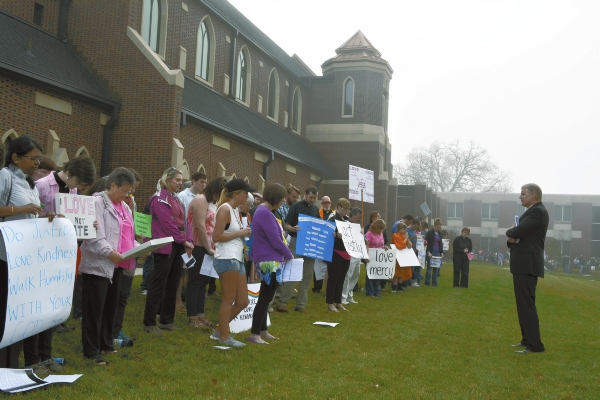Lutherans protest for peace at Trump rally
Published 12:00 am Tuesday, March 15, 2016

- Bishop Tim Smith prays with fellow protestors Monday morning on the campus of Lenoir-Rhyne University. Susan Shinn/For the Salisbury Post
By Susan Shinn
For The Salisbury Post
HICKORY — It may have been one of the more unusual political protest groups in the North Carolina primary season: dozens of Lutheran clergy with hundreds of lay leaders and parishioners, their voices raised not with words of hate, but in songs of love. And in four-part harmony, no less.
They gathered early Monday morning on the campus of Lenoir-Rhyne University in Hickory, a small, liberal-arts Lutheran school that was catapulted into the national spotlight after Republican presidential candidate Donald J. Trump accepted an invitation to speak there late Friday.
Matt Canniff-Kesecker, a seminarian from Lutheran Theological Southern Seminary in Columbia, drove up to join a dozen or so colleagues and professors.
“Some of my professors canceled classes to encourage us to come,” said Canniff-Kesecker, holding a sheaf of pages stapled together. “I copied the entire justice and peace section from the ELW (Lutheran hymnal), which is a pretty handy protest songbook.”
Church and school leaders reiterated throughout the day that colleges and universities routinely issue standing invitations to political candidates. Trump was the only one who accepted the school’s invitation. Some speculated it was because the campus was closed for spring break.
Throughout the morning, the protestors sang a variety of songs and hymns, while Trump supporters waited quietly and patiently in a line that snaked all the way across the compact campus. There were a few scattered exchanges between the groups — and chants of “Build that wall!” or “USA! USA” broke out occasionally. But an extremely visible presence from multiple law enforcement agencies kept the conversation civil, for the most part. By and large, the two groups ignored one another, a wide, grassy lawn separating them.
Jimmy Devore of Asheville stood with the protestors, holding a poster with a peace symbol on it. Devore, with long hair and a long beard, said he had no connection to the university. He pointed to his poster when asked why he’d come.
And he liked the hymns, he said. “It sounds a lot better than ‘Build that wall.’”
Local students made their presence known.
Claire Hutto and Evie Malone, freshmen at Hickory High School, stood with posters that read “Love Trumps Hate” and “Take Your Hate Out of My State.”
The favorite poster of the day was clearly “Donald, bless your heart — The South.”
(Non-Southerners may not realize that the phrase “bless your heart” is not always a term of endearment. Other posters would not make the evening network news or a family newspaper.)
There were some tense moments during the morning, but it seemed both sides were determined to be on their best behavior. “This is Western North Carolina,” one Trump supporter said. “We’re different here.” Two other supporters talked about how the media was inciting the violence. (That made me chuckle, I have to admit.)
The early morning’s dense fog diverted Trump’s plane to Hickory. Instead, his motorcade drove in from Charlotte, arriving almost two hours late from the scheduled 10 a.m. appearance. The delay indirectly served to diffuse tensions.
The protestors stood in front of Grace Chapel, a beautiful facility the university opened in 2014.
The protest was conceived and led by Bishop Tim Smith, bishop of the N.C. Synod of the ELCA, whose state offices are based in Salisbury. After strongly speaking out over the weekend against Trump’s appearance, Smith by Monday had taken on a much more conciliatory — and apologetic — tone.
“I was pleased that we had a lot of people show up,” he said. “I was pleased with the tone on both sides of things. We did about the best we could do today.”
Following the Trump appearance, a goodly number of the protestors who remained gathered for a service of healing in the chapel, scheduled by the university.
Dr. Wayne Powell, the college’s president, paused for a few minutes at the beginning of the service to gather his thoughts. It had clearly been a draining day for Powell, attired in a gray suit, pink shirt and floral tie. He also sported a small pink heart sticker on his face.
Powell said that university had received harsh criticism for hosting the event, including criticism from ELCA pastors, “and that cannot be denied.”
But, he said, it is the university’s responsibility to respect all people — and respect different political parties.
“The only way we can cleanse ourselves from some anger is to come here and worship and show love together,” he said. He then prayed the Prayer of St. Francis.
In his remarks, Smith referred to scripture from James, about how the tongue is a small member but boasts of great exploits. The saying “sticks and stones may break my bones, but words will never hurt me” is ridiculous, he said. “Words hurt immensely, and words last.”
Smith acknowledged that the society in which we live is polarized, but its greatest polarity is individualism versus living in meaningful community.
“Our calling is to work for justice, to be kind, to show love, to welcome the stranger and include everyone,” Smith said.
He said if given the opportunity to speak with the candidate, he would encourage Trump to build bridges, not walls.
The service ended with the congregation sharing the peace, and singing, “Lord of All Hopefulness.” Outside, the campus was quiet, the sun was shining, and the words of the hymn carried on a gentle afternoon breeze.
Freelance writer Susan Shinn lives in Salisbury.




